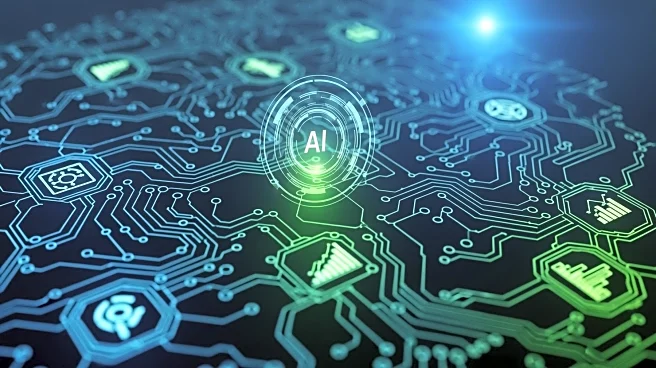What's Happening?
OpenAI has introduced a Workforce Blueprint aimed at guiding policymakers, businesses, and labor organizations in adapting to an AI-driven economy. The Blueprint, announced via LinkedIn and detailed in a blog
post, serves as a framework for coordinated efforts across public and private sectors. OpenAI, known for developing AI models like ChatGPT and DALL·E, is focusing on the long-term labor implications of its technology. The company’s analysis of ChatGPT data reveals that AI is primarily used for seeking information, practical guidance, and writing, with a significant portion of interactions being work-related. OpenAI’s chief economist, Ronnie Chatterji, notes that AI is currently more of an enabler than a replacer, enhancing productivity rather than eliminating jobs. The Blueprint includes initiatives such as OpenAI Academy, Certifications, and a Jobs Platform to support individuals and organizations in adapting to AI-driven changes.
Why It's Important?
The introduction of OpenAI's Workforce Blueprint is significant as it addresses the evolving landscape of work in the face of AI advancements. By providing training and certification programs, OpenAI aims to equip workers with the necessary skills to thrive in an AI-powered economy. This initiative could potentially mitigate job displacement concerns by focusing on skill development and job matching. The Blueprint emphasizes the need for collaboration between government, academia, and industry to ensure equitable access to AI tools and bridge skills gaps. As AI continues to transform various sectors, the Blueprint represents a proactive approach to workforce education and economic inclusion, highlighting the importance of preparing for the Intelligence Age.
What's Next?
OpenAI plans to further engage with workforce and education discussions by hosting its inaugural Higher Education Guild in San Francisco, focusing on AI's role in teaching and academic research. The company will also celebrate the first anniversary of OpenAI Academy with a public session on expanding AI literacy. These events aim to foster dialogue and collaboration among stakeholders to ensure that AI's benefits are widely distributed. OpenAI's commitment to community workforce partnerships and infrastructure investment suggests ongoing efforts to promote AI literacy and create pathways for individuals to succeed in the AI-driven economy.
Beyond the Headlines
The Workforce Blueprint not only addresses immediate workforce challenges but also raises ethical considerations regarding the future of work. OpenAI acknowledges that technological transformation will not be uniform, with some roles disappearing while others evolve or emerge. The Blueprint calls for shared responsibility across sectors to ensure that AI innovation aligns with social and economic inclusion. This approach highlights the need for long-term strategies that combine infrastructure investment with educational and employment pipelines, balancing optimism with responsibility in the face of rapid technological change.










